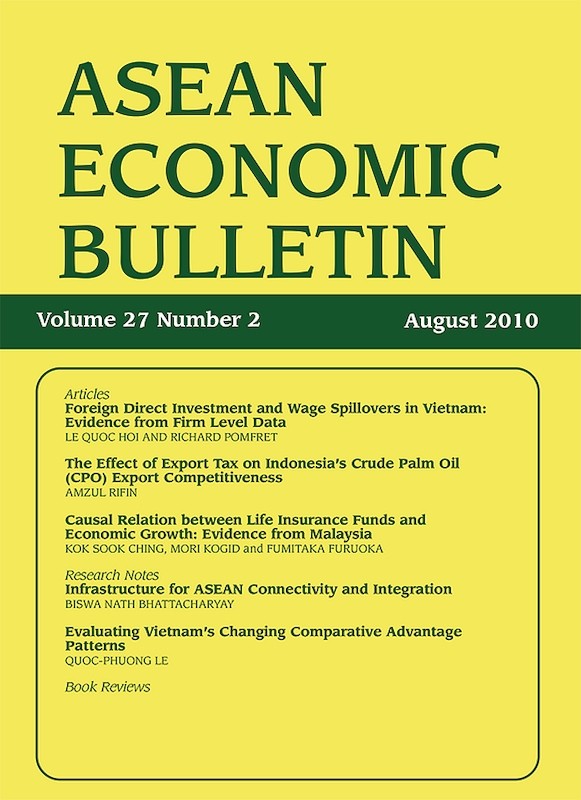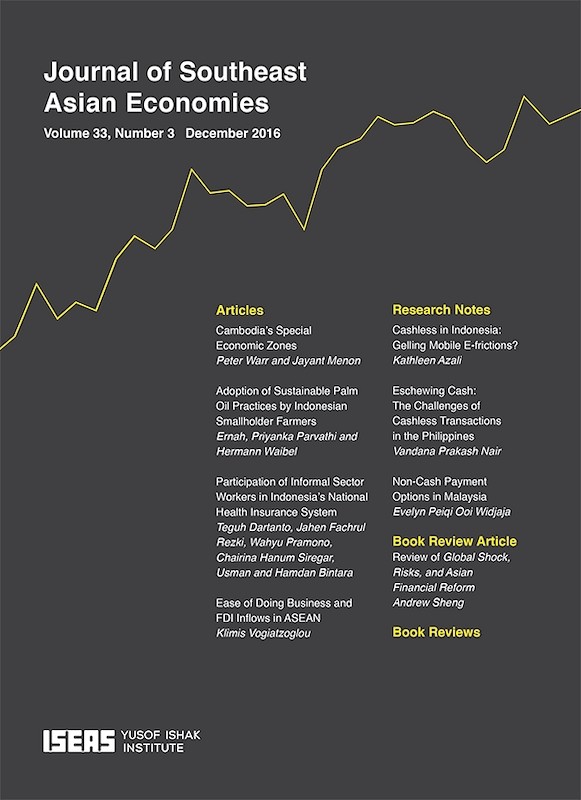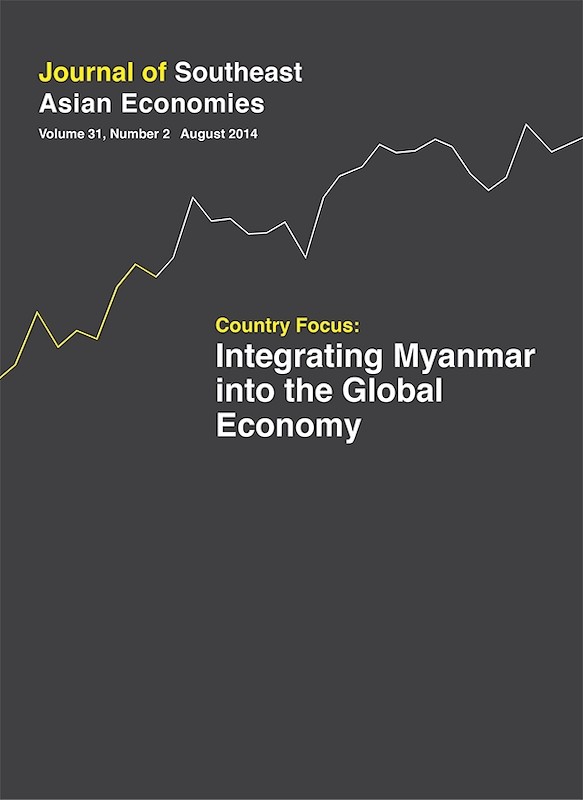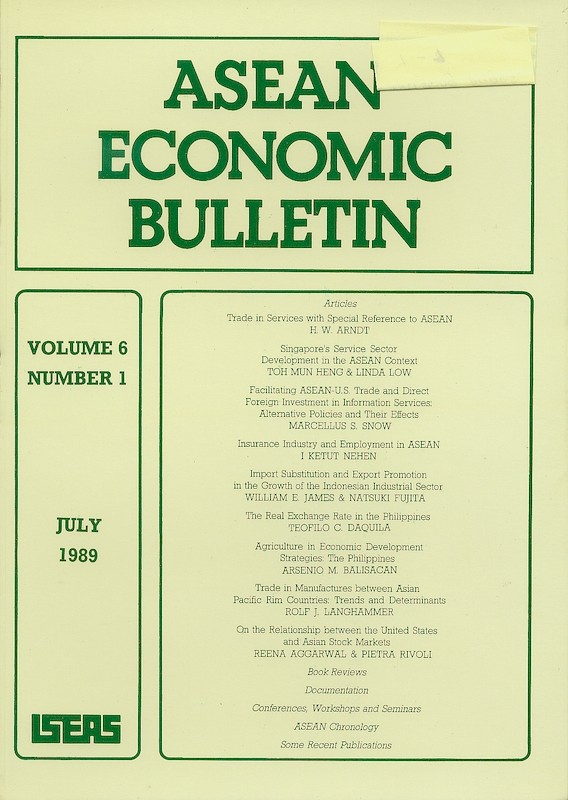Journal of Southeast Asian Economies Vol. 32/3 (Dec 2015)
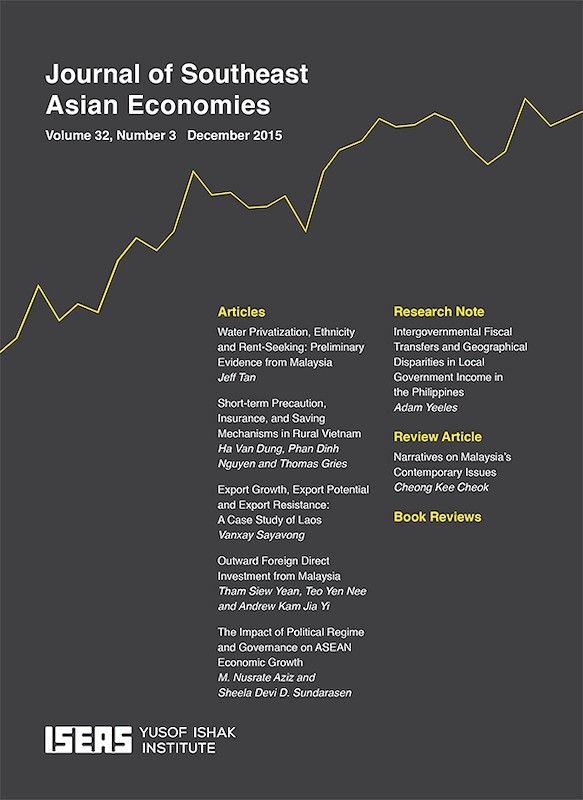
Date of publication:
December 2015
Publisher:
ISEAS – Yusof Ishak Institute
Number of pages:
124
Code:
AE32/3
Contents
-
Journal of Southeast Asian Economies Vol. 32/3 (Dec 2015)
[Whole Publication, ISSN: 23395206] -
Preliminary pages
- ARTICLES
-
Water Privatization, Ethnicity and Rent-Seeking: Preliminary Evidence from Malaysia, by Jeff Tan, author see abstractThis paper examines the ongoing promotion of infrastructure and water privatization in Malaysia despite the failure to increase capital investment and improve efficiency. It locates privatization within the process of capital accumulation, with rents and rent-seeking as an integral part of this. In this context, water privatization provides opportunities for the creation of entrepreneurs through the allocation of rents in the form of water-related contracts. The paper provides preliminary evidence, drawing from privatized water and sewerage projects in the state of Selangor to illustrate how this offers rents for both bumiputera (Malay) and non-bumiputera entrepreneurs. Rent-seeking is driven by changes in social formations and specifically the emergence of a Malay middle class that needed to be politically accommodated.
-
Short-term Precaution, Insurance, and Saving Mechanisms in Rural Vietnam, by Ha Van Dung, Phan Dinh Nguyen, Thomas Power, authors see abstractThis study investigates the impact of short-term precautionary selection and insurance on household decisions with respect to their participation in different saving mechanisms in rural Vietnam. A two-part model is used for the analysis and, unlike other studies, this paper investigates household decisions on participation in, and contribution, to formal and informal saving intermediaries. Furthermore, this study controls for the endogeneity of short-term precautionary motives and insurance in a household contribution model. This paper’s findings suggest that short-term precautionary motives reduce the probability of a household engaging in formal and informal saving intermediaries. In addition, insurance is found to be its substitute. Finally, precautionary savings appear to reduce participant deposits into formal saving intermediaries. However, there is no evidence of the effect of the insurance variable on household contributions to saving intermediaries.
-
Export Growth, Export Potentialand Export Resistance: A Case Study of Laos, by Vanxay Sayavong, author see abstractThis study applies a stochastic frontier gravity model to examine Laos’ export potential as well as factors hindering its export growth. This article uses a panel data of thirty-four importing countries from 2001 to 2011. Three main export growth factors are analysed in the model: (i) core factors (income per capita, population, and distance); (ii) implicit behind-the-border constraints; and (iii) implicit beyond-the-border constraints. The findings show that only half of the country’s export potential has been realized to date and export losses can primarily be attributed to implicit behind-the-border constraints. At the same time, these constraints have been reduced during the last decade. This article identifies border trade, a common language, income per capita and the Generalized System of Preferences scheme as important factors for export growth. Conversely, it finds that an appreciating real exchange rate is a signal of a slowdown in export growth.
-
Outward Foreign Direct Investment from Malaysia, by Tham Siew Yean, Teo Yen Nee, Andrew Kam Jia Yi, authors see abstractThe overall pattern of outward foreign direct investment from Malaysia indicates increasing participation in global outflows of foreign direct investment, especially to Southeast Asia. In 1980, Malaysia was ranked eleventh in the top fifteen developing and transition economies in terms of stocks of outward foreign direct investment, but it moved up to the tenth position by 2013. Outward flows surpassed inward flows after 2007 and Malaysia became a net capital exporter. This paper seeks to examine the pattern of outward foreign direct investment from the country, key motivations, and some of its impact. Government-linked companies are key players in these outward flows, especially in the oil and gas and services sector. The main findings in this paper show that outward investment from Malaysia is driven mainly by a horizontal, market-seeking type of investment while the literature indicates that its impact on trade is insignificant. Given the key role played by government-linked companies in outward foreign direct investment, an important return from these investments will be the repatriation of profits back to the home country. To promote greater transparency, these companies need to report to the public the returns and repatriation of profits on their investments abroad for Malaysia’s current and future development.
-
The Impact of Political Regime and Governance on ASEAN Economic Growth, by M. Nusrate Aziz, Sheela Devi D. Sundarasen, authors see abstractTraditionally, researchers have investigated the effect of intrinsic variables such as labour, capital and human capital on economic growth. However, the positive effect of intrinsic variables is reversed by countervailing extrinsic variables such as corruption, armed conflict and political regime, which have not been examined much by existing literature. This study empirically examines the impact of intrinsic and extrinsic variables on economic growth. We apply several estimation techniques using a 2000–09 balanced panel data for ASEAN countries. The study finds that both intrinsic and extrinsic determinants of economic growth are significant. However, countervailing effects of extrinsic variables are documented for growth in ASEAN countries. Corruption and armed conflict have a statistically significant and negative relationship with economic growth in ASEAN countries, whilst political regime is found to be statistically insignificant.
- RESEARCH NOTE
-
Intergovernmental Fiscal Transfers and Geographical Disparities in Local Government Income in the Philippines, by Adam Yeeles, author see abstractWhether intergovernmental transfers can remedy geographic disparities in development without an explicit horizontal equalization feature has been a matter of dispute. To address the issue, I explore spatial inequalities in per capita local government income in the Philippines across alternative notions of geography and examine the intersecting effect of vertical revenue transfers on observed inequalities. The Gini and Theil indices and their corresponding sub-group decompositions are utilized as analytic tools. First, overall inequality in local government income generation is moderate across national space. Second, the severity of income inequality varies across different geographic groupings. Third, it is shown that the current Philippine transfer system has a substantial equalizing effect in terms of national inequality, but a negligible impact on specific spatial inequalities. Notably, spatial income inequalities between local governments have remained steady over the last decade. Additionally, local governments are not sharply stratified over national space. Rather, the space economy is composed of several overlapping regional economic systems. The implications for intergovernmental fiscal transfer policy reform is discussed.
- REVIEW ARTICLE
-
Narratives on Malaysia's Contemporary Issues, by Cheong Kee Cheok, author see abstractA review article for the books:<br><i>Malaysia’s Socio-Economic Transformation: Ideas for the Next Decade</i>, edited by Sanchita Basu Das and Lee Poh Onn. Singapore: Institute of Southeast Asian Studies, 2014.<br><i>Malaysia’s Development Challenges: Graduating from the Middle</i>, edited by Hal Hill, Tham Siew Yean and Ragayah Haji Mat Zin. London: Routledge, 2012. <br><i>Routledge Handbook of Contemporary Malaysia</i>, edited by Meredith Weiss. London: Routledge, 2015. <br>
- BOOK REVIEWS
-
BOOK REVIEW: Asia Rising: Growth and Resilience in an Uncertain Global Economy, edited by Hal Hill and Maria Socorro Gochoco-Bautista, by Ian Coxhead, author
-
BOOK REVIEW: The Oxford Handbook of Asian Business Systems, edited by Michael A. Witt and Gordon Redding, by Francis E Hutchinson, author
-
BOOK REVIEW: The Entrepreneurial Rise in Southeast Asia: The Quadruple Helix Influence on Technological Innovation, edited by Stavros Sindakis and Christian Walter, by Michael T. Schaper, author
-
BOOK REVIEW: Ethnic Chinese Entrepreneurship in Malaysia: On Contextualisation in International Business Studies, by Michael Jakobsen, by Chin Yee Whah, author
-
BOOK REVIEW: Frontier and Developing Asia: The Next Generation of Emerging Markets, edited by Alfred Schipke, by Jayarethanam Pillai, author

![Journal of Southeast Asian Economies Vol. 30/1 (Apr 2013) [formerly ASEAN Economic Bulletin]](/cover/AE30-1.jpg)
